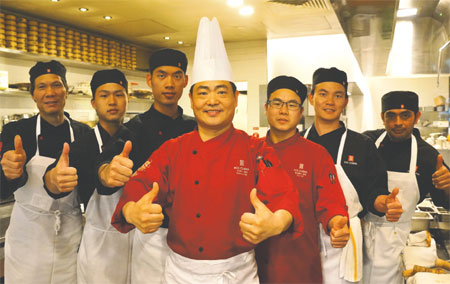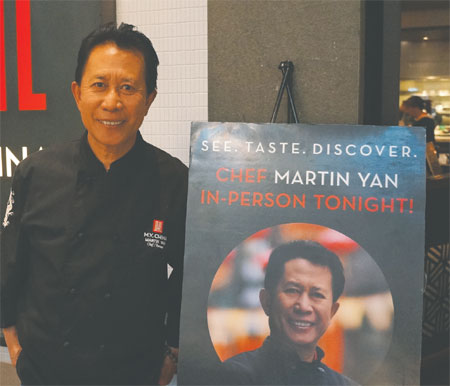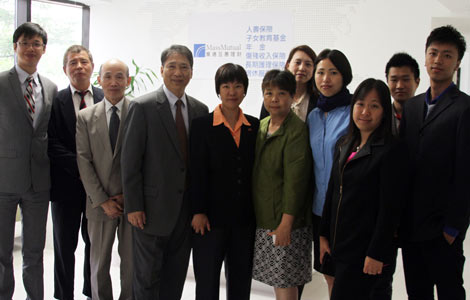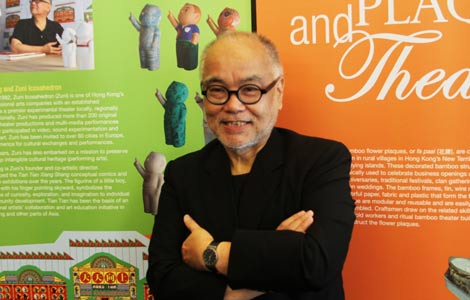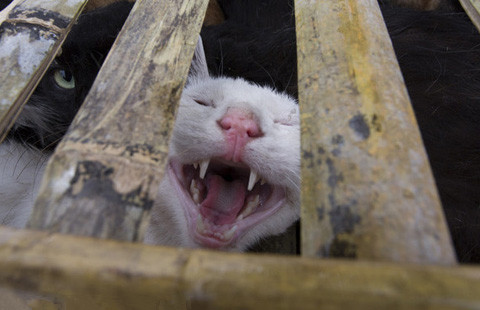M.Y. China: Tradition with a twist
Updated: 2014-07-11 11:57
By Chen Jia (China Daily USA)
|
||||||||
Its menu is a balance between traditional Chinese cuisine and a taste of today's China. And then there's the entertainment tossed into the mix. M.Y. China restaurant offers a unique take on modern Chinese food, CHEN JIA reports from San Francisco.
|
Executive chef Tony Wu (center), who develops the menu and the culinary team for M.Y. China, poses with his staff at the M.Y.China in Westfi eld San Francisco Center. Chen Jia / China Daily |
For Amber Black, who was born and raised in the New Mexico, managing a Chinese restaurant was never on her childhood dream list.
"There were not so many Chinese restaurants in New Mexico, so I had never been exposed to Chinese culture at all before coming to San Francisco," she told China Daily.
But since the end of 2012, Black has been part of the management team of M.Y. China restaurant, the new icon of the internationalization of Chinese food, located at the West. eld San Francisco Center, a luxurious shopping district. With $4 million from seven investors in China and the United States, the restaurant on Market Street opened in December 2012 with the goal of making modern Chinese cuisine more approachable to American diners. And they have been quite successful.
A second M.Y. China opened at Graton Resort & Casino of Rohnert Park, about a 40-minute drive north of San Francisco. A third one is coming soon to Cupertino in Silicon Valley. Eventually, the restaurant chain will have 10 branches nationwide.
M.Y. China is named a9 er Martin Yan, 51, who is a Chinese-American celebrity chef and food writer. He has hosted his award-winning cooking show, Yan Can Cook, in the United States since 1978.
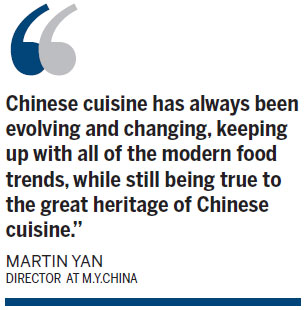
When Black went to M.Y. China for the first time, the American noticed many differences between it and other restaurants in San Francisco's Chinatown.
"M.Y. China has an open kitchen, so dinners are able to see exactly what they are going to eat and how the chef cooks," she said. "That's really cool."
During Black's . rst visit, the Chinese chef showed his "pulling-noodle" skills to diners while dancing Gangnan style, and pulling 16,000 noodles in two minutes. "I just loved it!" she said.
"An 1,800-pound monastery bell is in M.Y. China's semi-circular bar. Steel, marble and glass give a contemporary feel, while wood-block counters and diecut walls are a nod to the chef 's skilled hands with the cleaver," she said.
The whole scene was enough to make Black decide to settle down in San Francisco so she could work at M.Y. China.
"I decided to learn from the start," she said. "I am excited to keep expanding the reach of Chinese food culture with an international presence."
Executive chef
As the culinary director of M.Y. China, Yan does not get involved in the daily operations of the culinary team. His old friend Tony Wu is the executive chef.
Wu, 52, represents the new generation of talented chefs from the Chinese mainland.
Experimenting with new ingredients and cooking methods, he is one of the pioneers who combine dynamic and innovative approach with traditional Chinese cooking.
Wu was born in Shandong province and grew up in Tianjin, a metropolis in northern China. He learned cooking in Nanjing, a city in southeastern China.
His culinary expertise encompasses both northern and southern Chinese cooking, including mastery of eight different noodle preparations, vegetable carving and knife work.
He has won many top honors, including 33 gold medals in numerous culinary competitions, domestic and overseas. As the vice-president of the International Chinese Cuisine Association, he is also one of the few certified judges for Chinese culinary competitions.
"I am proud to have cooked for the prime minister of Japan and prepared a state banquet for the king of Thailand and many prominent oG cials," Wu said.
In 1996, Wu moved to Toronto to work at the Peking Men Restaurant before opening Lee Shen Dek in Vancouver.
"Chinese restaurants could surpass the status of French restaurants if we play it right." he said. "For Western dinners entering a Chinese restaurant, environment, menu options, food quality and value for money are just a few things to keep in mind," .
Wu tried to develop his own business in Seattle and Guangzhou in South China until Yan invited him to join the M.Y. China team. He said M.Y. China will not copy the business models of other Chinese restaurant chains in the US like P.F.Chang's and Panda Express.
Offering a unique take on modern Chinese cuisine, the restaurant is not as expensive as Hakkasan, the worldrenowned Michelin-star Chinese restaurant in New York City, he said.
But M.Y.China provides VIP service for dinners seeking the fun of a secret menu, at a per person cost of between $100 and $250, he said. "Tell me what raw material you want to eat and how much money you want to spend, I will surprise you with a visual and tasty feast at M.Y. China," Wu said.
M.Y. China's menu is a balance between traditional Chinese cuisine and a taste of today's China. It reJ ects Yan's travel throughout the Far East. To respect the past but give the new a nod, the menu is built on three primary categories: handpulled noodles, dim sum and wok-fired entrees. Tradition and innovation are honored throughout the menu.
M.Y. China departs from the typically long Chinese restaurant menu to present only seasonally inspired fare. Rather than 50 to 60 dim sum dishes, M.Y. China will focus on 10 to 15 selections, which may include such favorites as shrimp Hargow Dumplings as well as more modern interpretations of Xiao Long Bao "juicy dumplings" stuffed with black truffles.
Noodle-pullers
Master noodle-pullers serve the traditional La-mein (hand-pulled) noodles in soup or with sauce and the hand-cut Daochow style stir-fried noodles.
Examples include beef hand-pulled noodle soup with slow simmered short ribs, wild boar scissor cut noodles and squid ink snap noodles with seafood including shrimp, scallops and calamari.
Meanwhile, exhibition-woks sizzle with American kobe beef medallions, wok tossed shrimp with ginkgo nuts and Kung Pao live Dungeness Crab. Even such time-honored classics as crispy roast chicken get a new twist with fennel slaw and salt plum seasoning.
"The menu is creative and innovative. We offer items that are comfortable for American tastes, with the special, fresh, great ingredients they are familiar with, and we prepare them innovatively," s aid Yan. "We also want to create wonderful entertainment, because it's something that has been neglected in the way Chinese food is presented in America."
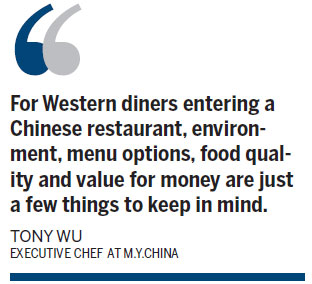
At their Beijing restaurant, the kitchen is completely open because this is the modern trend in China and Asia, and it's only now coming to America, Yan said.
"We want the diners to share our hard work, our passion, our knowledge, and the joy, excitement, and wonderful J avors of Chinese cuisine," he said. "M.Y. China will be a restaurant of entertainment, a restaurant of good food, and a restaurant of education."
Leading edge
To Yan, it comes down to being on the leading edge of a new appreciation for Chinese cuisine as well as passion.
"We definitely feel that it's time for Chinese cuisine to take its rightful place at the table among all the other great cuisines of the world," he said in an interview with China Daily in San Francisco where M.Y. China restaurant opened in December 2012 on Market Street.
And to the 51-year-old Yan that means creating the right atmosphere and food that encompass more than rice and two items or the typical all-you-can-eat buffet image that comes to mind for the average US diner when asked about Chinese food.
"For us, it's about sharing an experience to see, taste and discover Chinese cuisine that is inspired by my travels, cooking shows and cookbooks for the last 30 years," he said. "Once they realize that it's part of sharing our own experience, the food, the service, the decor, all come together where it makes sense to be dining in an upscale environment."
In the 1980s and 1990s, a family-run operation was the business model for overseas Chinese restaurants, making them comparable to a fast-food restaurant chain like McDonald's, Yan said.
Now Chinese restaurants in the US are starting to catch up with the great restaurants that are already established in Beijing, Shanghai and Hong Kong, he said.
"In these cosmopolitan cities, Chinese cuisine has always been evolving and changing, keeping up with all of the modern food trends, while still being true to the great heritage of Chinese cuisine," Yan said.
In addition to being the culinary director of M.Y. China, Yan is also an investor in the restaurant group.
Presenting authentic Chinese food in the high-end restaurant market in the US doesn't always lead to a successful business, he said.
The monthly gross revenue of M.Y. China in San Francisco has reached $500,000, said Yan, who expects it will take less than three years to recover the costs of opening the San Francisco restaurant.
Yan was born in Guangzhou, a city in South China, where his father operated a restaurant and his mother worked in a grocery store. He started cooking when he was 12. In 1961, he went to Hong Kong and studied at the Munsang College in Kowloon City. During his spare time, he worked at his uncle's Chinese restaurant, where he learned the traditional method of Chinese barbecue.
After Yan received a diploma from the Overseas Institute of Cookery of Hong Kong, he went to Canada for further study. In 1975, he got a master's in food science from the University of California, Davis.
Almost 40 years later, in 2013, Yan showcased a traditional Chinese dish at the launch party for a Confucius Institute at UC-Davis as its culinary adviser and a certi. ed master chef.
Yan has opened a chain of Yan Can Restaurants and founded the Yan Can International Cooking School in the San Francisco Bay Area. He has written more than two dozen cookbooks and appeared in more than 3,000 episodes of Yan Can Cook on public television.
"Throughout my 33 years in television and teaching on the road, one thing I've loved is the interaction with the guests. At M.Y. China, we want to get close to the diners," he said. "We want to have an interaction."
Yan said great chefs like Graham Kerr, Jacques Pepin or Bobby Flay have been able to stay active for such a long time because they are passionate. "We are passionate because we love what we do," he said. Contact the writer at chenjia@chinadailyusa.com
|
M.Y. China culinary director Martin Yan at the restaurant in San Francisco. Chen Jia / China Daily |
(China Daily USA 07/11/2014 page20)
- ROK to become largest destination for Chinese tourists
- Guangdong to reward terror informants up to half million RMB
- Giant Buddha image displayed at Tashi Lhunpo Monastery
- Beauties from around the world take part in Nanjing contest
- No more catching Z's in IKEA Nanjing
- Grannies turn streets into strange dance floors

 President Xi meets Greek counterpart
President Xi meets Greek counterpart
 Last hurrah for Sabella
Last hurrah for Sabella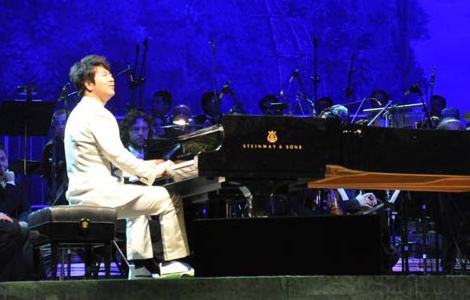
 Lang Lang performs at World Cup concert
Lang Lang performs at World Cup concert
 APEC forum attracts Pacific Rim leaders
APEC forum attracts Pacific Rim leaders
 Hacker Attacks Memorial Hall's website
Hacker Attacks Memorial Hall's website
 Chinese president pledges to enhance ties with Greece
Chinese president pledges to enhance ties with Greece
 M.Y. China: Tradition with a twist
M.Y. China: Tradition with a twist
 A look at some of the best goals at the World Cup
A look at some of the best goals at the World Cup
Most Viewed
Editor's Picks

|

|

|

|

|

|
Today's Top News
Xi stops in Greece on way to Brazil
Xi stops in Greece on way to Brazil
China promotes 4 officers to general
Bus carrying Chinese tourists crashes in US
LeBron James back to Cleveland
China, US pledge partnership
RMB use is on the rise in US
Chinese see NYC real estate as a sound place
US Weekly

|

|
